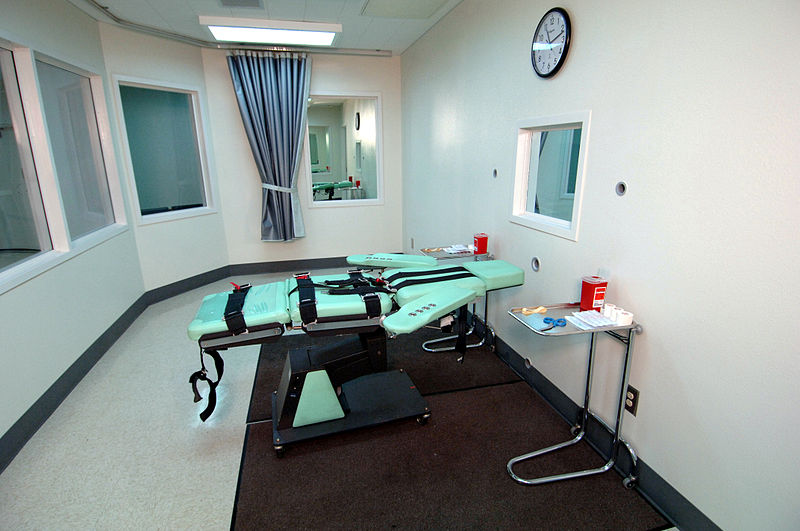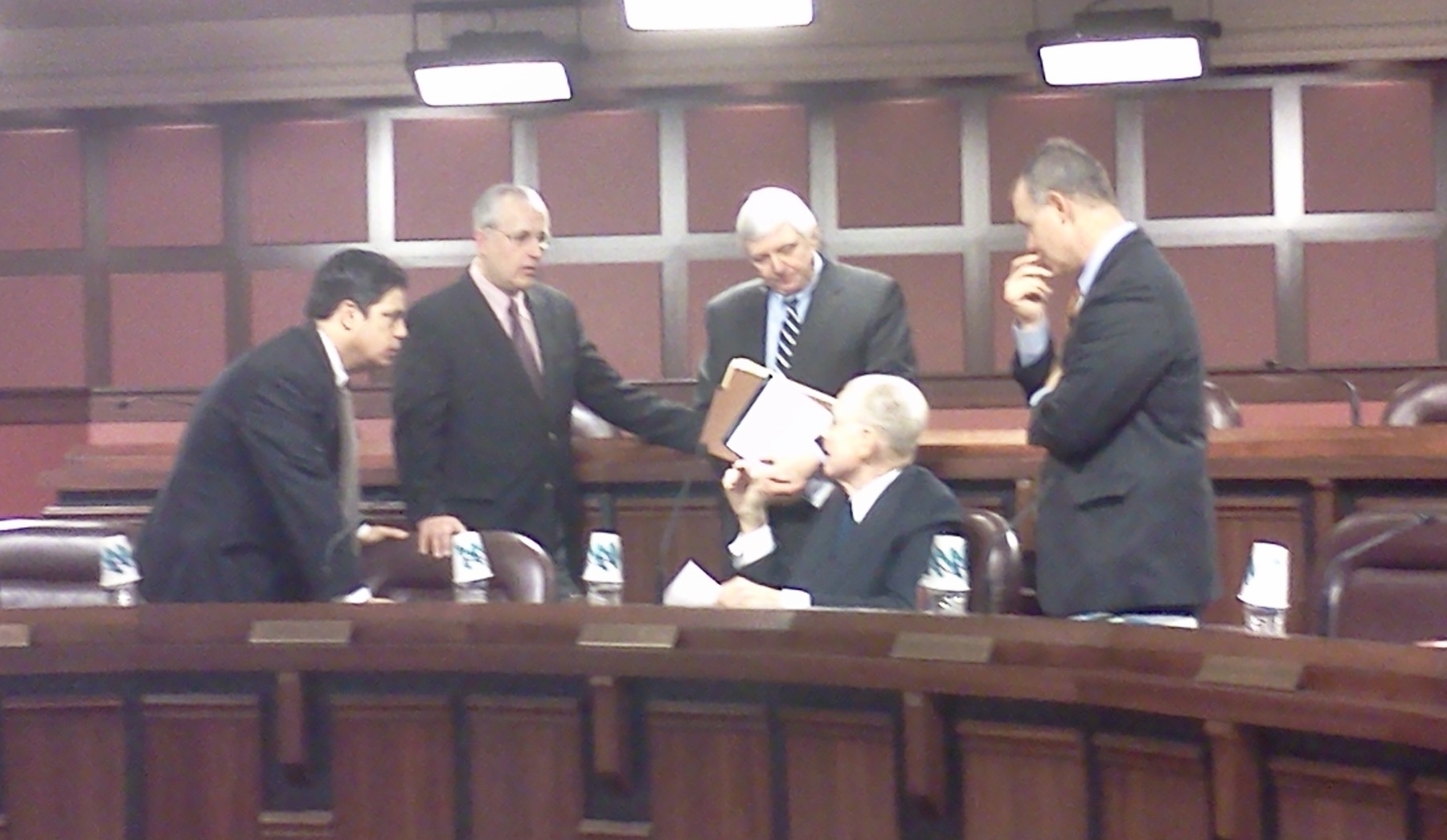Posts
Radio PA Roundtable – May 15-17, 2015
/in Audio, Media, News, Radio PA Roundtable /by PAMattersOn this week’s Radio PA Roundtable, recapping the deadly Amtrak derailment in Philadelphia; a look at the fast and furious legislative action in Harrisburg this past week; and a preview of Tuesday’s primary elections and the prospects of the 12 candidates for three open seats on the state Supreme Court to connect with the voters.
Click the audio player below to hear the full broadcast:
Stevens Confirmed for Supreme Court
/1 Comment/in News /by Brad ChristmanThe state Senate has unanimously confirmed Judge Correale Stevens to take a seat on the Pennsylvania Supreme Court. Stevens was nominated by Governor Tom Corbett to fill the seat of former Justice Joan Orie Melvin, who is currently appealing her conviction on corruption charges related to the use of taxpayer-funded staff for campaign purposes.
Stevens’ nomination had sailed through committee and faced no serious opposition. He heads to the state’s high court carrying the endorsement of both parties in the Senate. Democrat John Yudichak called Stevens “uniquely qualified,” and said they shared the sentiment that “public service is paramount to partisan pursuits.”
A graduate of Penn State University and the Dickinson School of Law, Stevens has served as President Judge on the state Superior Court since 2011. He’s also been a county judge and a State Representative.
PA High Court Deems Final Redistricting Plan Constitutional
/in News /by PAMattersThe Pennsylvania Supreme Court has unanimously ruled to dismiss the appeals filed by critics of the Legislative Reapportionment Commission’s 2012 Revised Final Plan. In his opinion Chief Justice Ronald Castille suggested the question of municipal splits was “close,” but writes that the appellants did not prove the plan is contrary to law.
The state’s high court had previously rejected a 2011 version of the redistricting plan.
Four justices joined with Castille on the latest opinion, and Justice Saylor Thomas Saylor wrote his own concurring opinion. Recently convicted, resigned & sentenced Justice Joan Orie Melvin did not participate.
“I was happy that the decision was unanimous,” Senate Majority Leader Dominic Pileggi (R-Delaware) told a group of reporters gathered in his capitol offices. “There was not a single dissenting opinion and it’s a very diverse court.”
Senate Democrats were among the appellants and Minority Leader Jay Costa (D-Allegheny) released a statement calling today’s decision disappointing. “However, Senate Democrats recognize that the court has now ruled and that it is time to move on in crafting policies that serve all citizens of Pennsylvania,” Costa’s statement concludes.
The new legislative boundaries will be in effect for next year’s legislative elections.
Merit Selection Would End Statewide Judicial Elections
/in News /by PAMattersThe latest push for the merit selection of Pennsylvania judges comes as suspended state Supreme Court Justice Joan Orie Melvin stands trial on a series of campaign corruption charges. “[Melvin’s trial] should be Exhibit A on why we need a system of choosing judges that doesn’t involve partisan campaign practices and judicial fundraising,” Pennsylvanians for Modern Courts Executive Director Lynn Marks tells Radio PA. “It’s a very timely illustration.”
Senator Anthony Williams, a Philadelphia Democrat, was introducing his latest merit selection bill just as the jurors were being picked for Melvin’s Allegheny County trial. “I’ve filed a merit selection bill under a Democratic governor and I’m filing one under a Republican one. This isn’t a matter of partisanship. It’s about ensuring integrity on the bench,” Williams said in a statement.
Under the merit selection bill, appellate court judges (Commonwealth, Superior, Supreme) would be nominated by the governor from a pool of candidates that have been pre-selected by an independent, bipartisan commission. The governor’s selection would then be subject to the Senate confirmation process.
“It doesn’t make sense to have people campaign in a totally partisan process, while at the same time they’re pledging to be non-partisan after Election Day,” says Marks.
While critics say this sort of reform plan is more ‘political appointment’ than merit selection, Marks stresses that it takes the money out of the process. She’s not naive enough to say it’s going to get rid of all the politics, but Marks calls merit selection a vast improvement over the current system.
Merit selection would require a constitutional amendment, which means Williams’ bill would need to pass the General Assembly in two consecutive sessions before it could be put to the voters for ratification.
Philadelphia Judge Stays Execution, D-A Vows Appeal
/in News /by PAMattersA Philadelphia judge has halted Wednesday’s scheduled execution of death row inmate Terrance Williams and granted him a new sentencing hearing. But prosecutors vow to appeal to the state Supreme Court.
The judge not only granted a stay of execution, she vacated the death sentence, which grants Williams a new penalty phase. In the ruling, Judge M. Teresa Sarmina was critical of the way the prosecution handled the original trial in the 1984 murder that put Williams on death row. The prosecution has denied any wrongdoing.
Williams still has a request for clemency pending before the state Pardons Board. The board voted after a hearing on Thursday to take the request under advisement.
Voter ID Case Goes Back to Commonwealth Court
/in News /by PAMattersThe state’s highest court issued a ruling today, which sends the controversial Voter ID case back to Commonwealth Court for further investigation. The seven page order indicates that photo ID requirements are, in fact, constitutional but the question remains implementation.
The Supreme Court cites an aggressive timetable and an implementation process that’s been anything but seamless in its call for the Commonwealth Court to assess the availability of alternate identification cards for those without a PennDOT ID or the papers needed to obtain one.
Upon the assessment, Commonwealth Court must decide whether voter disenfranchisement exists. If it does, the lower court will called upon to issue a temporary injunction. If not, the law will stand. The high court has set an October 2nd deadline for that decision.
Two justices issued dissenting opinions. Justice Debra McCloskey Todd says the structure and timing of the law will disenfranchise voters. Justice Seamus McCaffery contends the reason for implementing the new requirement so quickly is purely political.
A Department of State spokesman tells Radio PA that any voter who wants an ID for voting purposes will be able to get one. “We’re pleased to provide what we believe will be supporting information to that effect.”
Training Tool Does More than Meet Federal Mandate
/in News /by PAMattersA federal mandate requires specialized training for lawyers representing abused and neglected children, if the state is to continue to receive $950,000 dollars a year for related services. The state Supreme Court’s Office of Children and Families in the Courts responded with a first-of-its-kind training DVD.
“Even though it started out to particularly meet a federal mandate, it really turned into a lot more,” says Butler County Judge Kelley Streib, who co-chaired the panel that helped create the new training tool for guardians ad litem.
The video includes all of the relevant laws and procedures, but we asked Judge Streib to explain what really stands out in her mind:JudgeStreib
“No longer is it acceptable to have children languishing for years in the dependency system,” Streib explains. That’s been a major focus of both the state courts and Department of Public Welfare in recent years. Since 2006, the number of dependent children in temporary foster care has been reduced by 33%.
Public Hearing Pending on New Legislative Redistricting Plan
/in News /by PAMattersThe Legislative Reapportionment Commission is gearing up for a May 2nd public hearing on a new preliminary plan. Anyone who’d like to address the panel at the capitol hearing must submit a written request by Wednesday. Earlier this year, the state Supreme Court threw out the Commission’s first attempt.
The revised preliminary plan was adopted with a 4 – 1 vote last week. One of the observers was Amanda Holt, the Lehigh County piano teacher and graphic artist whose own stab at mapmaking showed the Supreme Court that it can be done with greater respect to the integrity of political subdivisions. “I felt like there was a lot of talk about compromise, and my concern would be that our constitution not be compromised in this process,” Holt says of the latest LRC meeting.
Holt hasn’t formally requested it yet, but she’d like the chance to address the panel again at next month’s public hearing. “Citizens have been able to make a difference in this process, and bring light to our constitution, and help parts of our constitution that were ignored in this process,” she says.
Watching the process since the LRC’s first public meeting in March 2011 has been Common Cause Pennsylvania Executive Director Barry Kauffman. “I’m always the optimist, hopeful that we can still make some tweaks in the proposed plan, still have it better serve the people of Pennsylvania,” Kauffman says of the latest public comment period.
The Commission’s revised plan would split about half as many municipalities as the remanded 2011 House and Senate maps. The new maps are supposed to be in place for this year’s legislative elections, but the Supreme Court ordered that the 2001 maps remain in place until the process is resolved.
Legislative Reapportionment Commission Okays Preliminary Plan… Again
/in News /by PAMattersPennsylvania’s latest set of redistricting maps is now available for public comment. The redrawn House and Senate maps put more emphasis on reducing municipal splits, and less emphasis on population deviation, per the direction of the state Supreme Court. The high court threw out the Legislative Reapportionment Commission’s first attempt early this year.
The House maps reduce the number of municipal splits from 108 to 68, according to GOP Leader Mike Turzai (R-Allegheny). “Population deviation however – in particular reason to reduce splits – did increase from 5.97% to 7.76%.”
Rep. Turzai notes that five House seats were moved based on the new population data, but he says it was to nobody’s partisan advantage.
The court-appointed chairman of the five-member panel made waves when he insisted on a change in the proposed Senate map. Population shifts dictate that a Senate seat be moved from western PA to the northeast. Senate Republican Leader Dominic Pileggi (R-Delaware) contends the data dictates that Democrat Jim Brewster’s seat be moved, but he acquiesced to Chairman Stephen McEwen who wanted to move Republican Jane Orie’s seat instead. Orie was recently convicted on public corruption charges, which means her seat is vacant.
The Commission voted 4 – 1 in favor of the preliminary maps, with Senate Democratic Leader Jay Costa (D-Allegheny) casting the lone dissenting vote. House Democratic Leader Frank Dermody (D-Allegheny) stressed that this is not the end of the redistricting process. “I am hopeful and confident that, as we listen and consider public comments, more will get done to improve the final plan,” Dermody said at Thursday’s meeting.
A public hearing is set for May 2nd.
Welcome to PAMatters.com, a new source for news and commentary from Pennsylvania’s capital. In addition to video, audio and pictures from the stories and events that affect YOU, you’ll also get some behind-the-scenes analysis via blogs from our award-winning staff of journalists.










